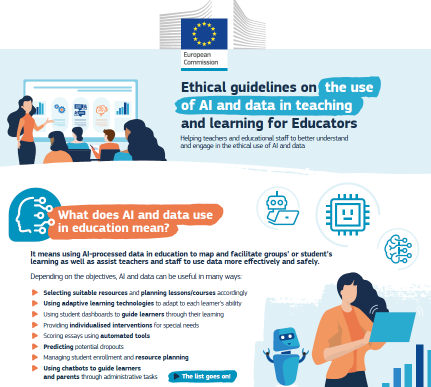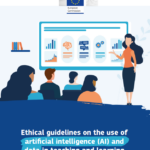
The Ethical Guidelines on the Use of Artificial Intelligence and Data in Teaching and Learning for Educators provides a comprehensive framework to guide educators and school leaders in the ethical deployment and use of AI and data in educational settings.
The document identifies four use cases: teaching students, supporting students, supporting teachers and supporting systems. It introduces seven guiding questions based on key requirements for trustworthy AI, and applies these to consider the use of AI in different educational settings.
- Emphasise human agency and oversight in AI systems to ensure that educators retain control and understanding of AI use in educational contexts.
- Promote transparency in AI operations to ensure that AI methods and decision-making processes are understandable to educators and students.
- Highlight the importance of diversity, non-discrimination and fairness, ensuring that AI systems are accessible to all students and do not perpetuate bias.
- Stress the need for social and environmental wellbeing, including the social and emotional impact of AI on learners.
- Emphasise privacy and data governance, ensuring compliance with data protection regulations and ethical use of data.
- Recommend technical robustness and security to protect against data breaches and ensure the reliability of AI systems.
- Calling for accountability in the use of AI, ensuring that mechanisms are in place to monitor, evaluate and report on the impact of AI in education.
These guidelines aim to promote a responsible, ethical and inclusive approach to the use of AI and data in education, promoting beneficial outcomes while mitigating potential risks. They provide an excellent starting point for understanding the ethical implications of AI in education, and the guiding questions help guide teachers towards a systemic approach.
There is a strong emphasis on the development of digital literacy for educators, highlighting the need for teachers to understand the ethical implications of AI, improve their digital literacy and use these technologies responsibly in their teaching practice.
Read on to learn more: https://op.europa.eu/en/publication-detail/-/publication/d81a0d54-5348-11ed-92ed-01aa75ed71a1/language-en
